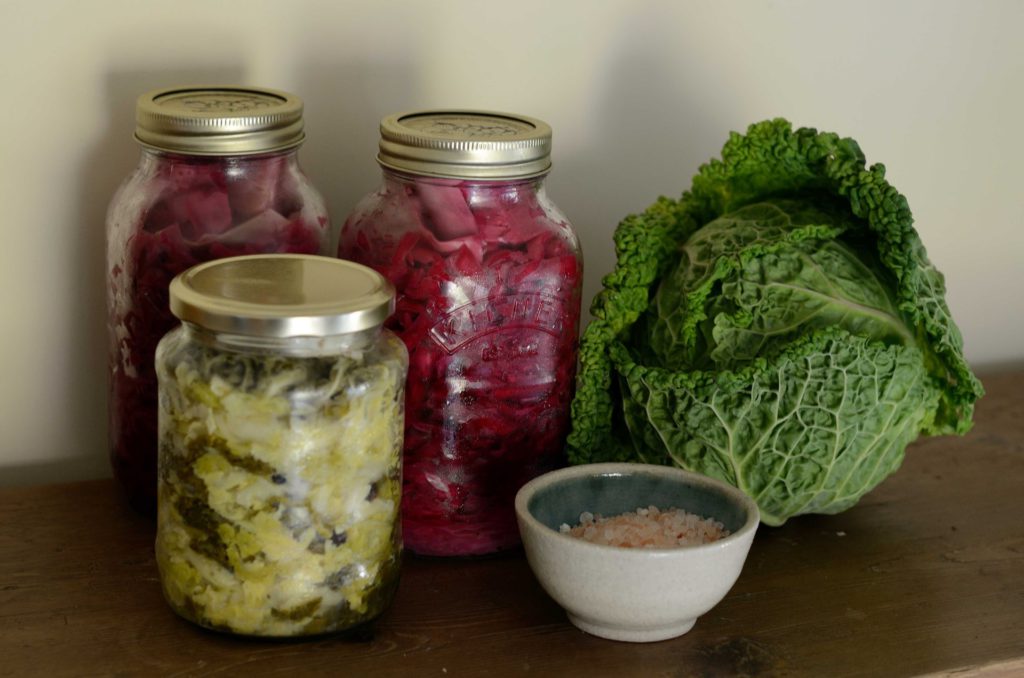A lot of attention is going towards our gut health these days. Numerous studies are opening our eyes to the fact that proper gut health goes beyond helping with digestion. An unhealthy gut can lead to autoimmune diseases, mental health issues, digestive issues, skin issues, etc. There is a huge study called The Human Microbiome Project that is trying to discover and map all of our microorganisms and how they affect our health. Bacteria make up a large portion of our microbiota in and on our bodies, with the majority living in our digestive tract. A big component to maintaining proper gut health is ensuring that we have the right bacteria in our system. If you didn’t already know, certain types of bacteria are really good for us! And it is imperative that the bacteria living in our gut are the good kind and that they stay well maintained and fed.

“..gut health goes beyond helping with digestion.”
Bugs and the Foods That Feeds Them
Good nutrition is key to a healthy gut. We can add specific foods to our diets to give the gut the resources it needs to stay in tip-top shape. Two things specifically to look at are probiotics and prebiotics. You have probably already heard about probiotics. There are a gajillion supplements on the market to help introduce these little critters to our system. The list is getting long for prebiotic supplements as well. You can, however, get both of these through a well-balanced diet without buying expensive supplements. Let’s first discuss the roles of prebiotics and probiotics?
- Probiotics: Live microorganisms taken in through either food or supplements. These ‘bugs’ keep our gut microbiome healthy and working in tip-top shape.
- Prebiotics: Essentially the food that feeds those healthy bugs in our gut microbiome. Prebiotics come from different carbs, mostly fiber, that we digest.
To recap, probiotics give us living organisms that hang out in our gut and prebiotics make sure those living organisms are properly fed. A healthy gut needs a lot of things but learning about pro- and prebiotics will get you started on the right track.

Fermented foods like sauerkraut and kimchi are tasty options for probiotics.
Foods for Probiotics and Prebiotics
As I mentioned above, you can provide your body with both probiotics and prebiotics through your diet, without taking supplements. You may find that you don’t enjoy the foods listed in the probiotic category and may still feel like a supplement is a way to go. Of course, I need to tell you to consult your doctor before taking ANY supplements!
Probiotic Foods: (can be challenging to add if you are not a fan of these types of foods)
- Yogurt
- Kefir (Fermented milk drink that comes in yummy flavors and can be found in most grocery stores.)
- Kombucha (Fermented tea that also comes in yummy flavors and found in most grocery stores.)
- Sauerkraut
- Kimchi (Basically spicy sauerkraut)
- Tempeh (Fermented soy product that reminds me of tofu. It can be used as a meat replacement in a stir-fry.)
- Miso (Can be purchased as a paste and just added to hot broth for a nice soup)
- Pickles
- Some Cheeses (Should see “live or active cultures” on the label.)
Prebiotic Foods: (these are much easier to add to your diet)
- Bananas
- Apples
- Jerusalem Artichokes
- Garlic
- Onions
- Asparagus
- Leeks
- Barley (Try to get the stuff in bread or cereals, not beer!)
- Oats (Choose old-fashioned oats, not instant.)
- Wheat Bran
- Cocoa (Choose 70% or higher chocolate. Or add cocoa to smoothies and protein shakes.)
- Flaxseeds
- Jicama (Cut up jicama makes a great dipping veggie.)
- Dandelion greens (If you are into juicing, add these to your green juice.)
- Seaweed (Most stores are selling this as a snack now.)
Signs of an Unhealthy Gut
So how do you know if you have a healthy or unhealthy gut? Generally, when the gut is well fed and functioning properly, things move along as they should without any constipation, bloating, or gas. To put it simply, you just feel good! Signs of an unhealthy gut can be vast. It could be anything from digestive issues to food intolerances, skin problems, auto-immune conditions, or other inflammatory issues. Whenever I’m dealing with ANYTHING, I look to my diet first. If you aren’t feeling just right and think it might be diet-related, start with these 5 things and see how you feel. And like I mentioned earlier, always talk to your doctor. There is not an MD after my name!
- Provide your body with both probiotics and prebiotics.
- Stay hydrated.
- Get enough sleep.
- Eat slowly
- Eliminate as many processed and sugary foods as you can.



